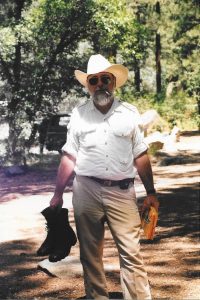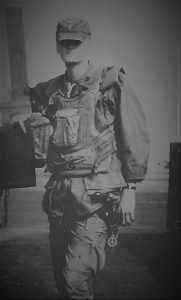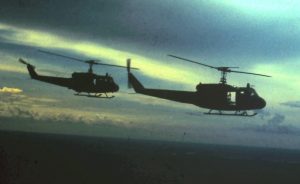Following the success of his many military thrillers, including the Vietnam Ground Zero Series and Wings Over Nam aviation thrillers, we are delighted to announce that we have signed a new historical military series by Eric Helm.
In Eric’s words:
“At the end of the 1980s and at the beginning of the 1990s, the world moved close to a world war that could easily escalate into a thermonuclear exchange that would end modern civilization. There were those who wished for nothing more because they believed it would thrust them to the top and in control of the world. And there were those who wanted to prevent that. Their purpose wasn’t always altruistic, but that goal matched their own climb to power. It is into this world that the characters in this series move, serving on every continent and sailing all the oceans, dealing with those problems.
“The characters are military and civilian, members of the media, and those with an academic frame of mind. Each brings an interesting take to the problems of trying to prevent a world war, except for one nation whose leaders believe such a conflict would benefit them. These are unique situations that require unique solutions. This is a tale told on the world stage with players at nearly every level of society.
“Sapere Books have been very good to me. The packaging of my Vietnam Ground Zero series has been perfect. The enthusiasm with which the books have been received has been wonderful. Sapere is a great publisher who have looked out for my best interests. Everyone seems to be excited by the various projects that I have suggested and there is no pressure to crank out a book quickly. They let it evolve naturally, which I believe makes the books that much better.”
Congratulations to Eric Helm, whose thrilling Vietnam War adventure, Proxy War, is published today!
Proxy War is the twenty-ninth book in the Vietnam: Ground Zero series: action-packed, authentic historical thrillers set during the Vietnam War.
Republic of Vietnam, 1969
The American government has known for a long time that there were Soviet advisors in North Vietnam, but now it seems they are ready to strike.
Intelligence has been gathered suggesting that Soviet fighter pilots have engaged in aerial combat with American Air Force and Navy pilots.
As of yet the Americans have not retaliated, as the UN is terrified of the Vietnam War escalating into a global nuclear disaster.
But the Soviets have been spotted engaging local Vietnamese troops and it seems they are readying for an attack.
U.S. Army Special Forces Major Mack Gerber and Sergeant Major Anthony Fetterman have been on light duties in Vietnam, during a relatively peaceful period in the war.
But after a visit to a Special Forces Camp, they are told that the enemy have been increasing their assaults on the base.
What are the Soviets planning? How large is their army?
Can the US Special Forces stop their deadly attack…?
Congratulations to Eric Helm, whose nail-biting military drama, Pioneer Post, is published today!
Pioneer Post is the twenty-eighth book in the Vietnam: Ground Zero series: action-packed, authentic historical thrillers set during the Vietnam War.
authentic historical thrillers set during the Vietnam War.
Hawaii, 1969
U.S. Army Special Forces Major Mack Gerber and Sergeant Major Anthony Fetterman knew the promise of R&R in Hawaii was too good to be true.
Barely a day into the trip, they are called into a top-secret meeting to discuss classified intelligence. But when they get there, the generals in charge seem reluctant to share any information.
Gerber and Fetterman have recently come back from a mission in Vietnam. Though they were successful, the location where they established their base camp went against instructions from their superiors – and they covered certain things up in their final debrief reports.
All had seemed well when they first returned to the US, but now Gerber is suspicious that a case is being built against them.
Gerber and Fetterman are told they have been called to Hawaii to share base-building tactics with a new team working on the set up of a mission that will take place in Vietnam. But are they really being used for their expertise, or is someone setting them up for a fall?
How loyal are the fellow green berets who served with them in combat? Will secrets be spilled about their time in the jungle?
And will Gerber and Fetterman’s illustrious careers end in tatters…?
We have received the very sad news that one of our authors, Bob Cornett, has passed away age 69. With Kevin D. Randle, Bob co-authored the Vietnam Ground Zero Military Thrillers and the Scorpion Squad Military Thrillers under the pseudonym Eric Helm. Kevin remembers Bob below.

Bob Cornett
On April 1, Robert Charles Cornett, “Bob,” sometimes known as R C Squared, passed away. Bob and I had been friends for nearly a half century. We met while we were both taking Air Force ROTC at the University of Iowa in the early 1970s. We shared an interest in science fiction and writing and a few other things.
Bob had originally majored in both physics and Russian, which seemed to be a very difficult path to follow. Eventually, he changed majors, and we both graduated in 1975. Bob remained in Iowa City.
It was in 1975 that I learned the Project Blue Book files had been declassified and were open for public scrutiny at Maxwell Air Force Base. Bob and I drove to Maxwell and began a search of those records. We might have been the first two outsiders to see those records. At the time, the names had not been redacted and we spent two days going through the index, writing down the names of all the witnesses for the unidentified sightings. At the time, this was a unique record, but today the information is available on the Internet. That search translated into a few magazine articles about Project Blue Book and sparked Bob’s interest in UFOs.
Writing had always been one of his goals, though I suspect he was more interested in writing science fiction than he was in writing about UFOs. We had written a book of science fiction short stories that was never published, but some of them have been posted to www.thesciencefictionsite.blogspot.com.
Bob had suggested that we talk to James Van Allen (a space scientist) about UFOs, because they knew each other. I thought it was just that Bob had taken a class from Van Allen and it was a sort of nodding friendship. But, one day, in the Physics Building, Van Allen got in the elevator with us. He looked at us and said, “Hi, Bob.”
And Bob said, “Hi, Van.”
Van Allen sat down with me for two hours to talk about UFOs. Bob missed the meeting for some reason, but it would not have happened had he not known Van Allen. That Van Allen would talk to me about UFOs said something about Bob.
We did investigate cattle mutilations for the Aerial Phenomena Research Organization (APRO). Jim Lorenzen (APRO’s co-director) had called me, asking me to look into them. With Bob, we went to Minnesota and spent a week to ten days there, learning what we could. We had been told that these mutilations were part of Satanic rituals, but we found no evidence to support that claim. Nor did we find anything to suggest that UFOs had anything to do with it.
All this resulted in Jim Lorenzen introducing Bob at a UFO convention as one of his top investigators. The irony was that Bob belonged to the rival National Investigations Committee On Aerial Phenomena (NICAP). But the recognition did help Bob place some stories about UFOs in the magazines that were popular at the time.
We began to attend science fiction conventions with a view to meeting the editors working for publishers. We thought that if we met them, if they knew who we were, then we might have a leg up when a manuscript was submitted. I’m not sure if that ever worked in our favour, but we did meet Sharon Jarvis, an agent looking for writers. She recognized our military connection and one day called, wondering if we could write books about the Green Berets in Vietnam. We said yes and set about creating those books, now all recently republished under the banner of Vietnam Ground Zero. This did not erase our quest to write science fiction. I don’t know if those books helped or not, but we did eventually publish science fiction.
I was at home one night when Bob called and told me he had started a novel that dealt with a war in space. We planned to meet the next day, and he suggested that I bring along something. His “chunk” of the book, as we came to call them, was in the third person, but mine was in the first person. Before we were done, the book, Seeds of War, had five first-person narrators, not all of whom survived the conflict, and the third-person beginning in which Earth declared war on another planet. I mention this only because we used Lyndon Johnson’s Gulf of Tonkin speech as the basis for the one in the book. We didn’t have to change much. It was a commentary on war. It was a strange attitude for us because of our connections to the military.
Bob and I attended many science fiction conventions, even after we had books published. At a party hosted by Berkley Books, we ended up as volunteer bartenders at about two in the morning. A very drunk science fiction fan wanted a Scotch, but we had run out. He was so drunk that we didn’t think he would know the difference, so we made some Scotch for him, using gin, Pepsi, and some wine, and we worked hard to make it look like Scotch. The man took it away happy.
We were at another science fiction convention in Minneapolis and were in the hotel room, working on a book. One of the characters was named Tom Waters, and I wrote the line, “Waters rushed up hill.”
Bob said, “You can’t say that.”
And I said, “Why not? No one will ever notice.”
From that point on, we often attempted to hide a bit of humour in the books for those astute enough to catch it. No one ever mentioned the waters rushing up hill to either of us.
Bob was popular on the science fiction circuit. I think it was a combination of things, including some of the stories that he wrote. He would do readings periodically, and I noticed that the fans sat quietly listening to his stories. He was sometimes slow in getting the story written, but it was always a good one. He was an imaginative writer, with a keen ear for human speech.
He was habitually late for nearly everything. We were to meet in Iowa City one day, but I got interested in a movie and figured that Bob would be late. So, I watched the end of the movie and was more than an hour late. Bob showed up about twenty minutes after I got there.
Bob eventually left Iowa City, moving to Moulton, Iowa, and our writing sessions waned at that point. We did a number of limited series, including one about time travel that started with Remember the Alamo, in which the time travellers return to 1836 to win the battle for the Texicans by using modern weapons.
But with the move to Moulton, our contacts lessened. I became involved in UFO research and Bob stuck closer to the science fiction. I think the last science fiction convention we attended together was in 1991, about the time of the Gulf War. We hadn’t been writing much together by that time. The Vietnam Ground Zero series had wound down and we didn’t have any contracts for science fiction novels.
Bob had trained as an EMT while living in Moulton and at some point had become a letter carrier. With his wife, MaryAnn, he eventually moved to Albuquerque where they hosted a few conventions.
Bob was interested in firearms and had a massive knowledge about them. Some of the writing about Vietnam showed just how much he knew about weapons. He was very good at describing the combat of the time. He was honourably discharged from the Air Force and later the Marines.
He was a very good friend, and I wish that I had been a better friend to him. I knew that his health had been poor these last few years. I had him on the radio version of A Different Perspective, and I was saddened by what I heard as we talked about UFOs. He just wasn’t as sharp as he had been when he was younger. You can listen to that show here: https://www.spreaker.com/episode/19655144
In the last several years, maybe the last couple of decades, he had lost his fire for writing. Bob Tucker (a mystery, action-adventure, and science fiction author), who turned out to be a good friend, had said in his later years that he had retired from writing. Neither Bob nor I could understand that attitude … but sometimes writing is a very difficult task. I think Bob retired from it without really saying that he was retired.
I had thought of writing a tribute to my friend, but this turned into more of a remembrance. I’m surprised by how much I miss him.
The Scorpion Squad Military Thrillers follow an American Battalion fighting in the Vietnam War. Below, Kevin D. Randle (Lt. Col. USAR) — one of the authors behind the pseudonym Eric Helm — reflects on the real-life experiences that provided the inspiration for the series.
I graduated high school the day before my 18th birthday in June 1967. In July, I was on a bus headed to Fort Polk, Louisiana, for basic  infantry training and in October, I was assigned to Fort Wolters, Texas, for my AIT, advanced individual training, which was as a helicopter pilot. From there I was sent to Fort Rucker, Alabama, to complete that training. In August 1968, as a 19-year-old teenager, I was appointed a warrant officer and then graduated from flight school as a helicopter pilot.
infantry training and in October, I was assigned to Fort Wolters, Texas, for my AIT, advanced individual training, which was as a helicopter pilot. From there I was sent to Fort Rucker, Alabama, to complete that training. In August 1968, as a 19-year-old teenager, I was appointed a warrant officer and then graduated from flight school as a helicopter pilot.
On September 23, 1968, I arrived in South Vietnam. We landed at Ton Son Nhut and were herded aboard buses that had no air conditioning. We all were covered with sweat within minutes of leaving the aircraft. The bus had screens over the open windows, but the pattern was something like an inch square. It wouldn’t keep out the insects. Someone said it was to keep out the grenades, and someone else said, “Yeah. Now they tie fishhooks to them.”
From Saigon we drove to Bien Hoa, Long Binh complex and the 90th Replacement Battalion. From there, a day or two later, I, with three other warrant officers, was assigned to the 116th Assault Helicopter Company at Cu Chi.

Kevin Randle after a day of flying combat assault missions in Vietnam.
During that first week, I flew rarely. There was an orientation flight to show me the local area. There was a check ride to ensure that I knew what to do if the engine quit, and to demonstrate my other skills. When that was completed, I was assigned to a flight, and then began flying combat assault missions. That meant that we picked up soldiers in one place, took them to another and landed. While many of those missions were without incident, some of them were more than a little exciting. Nothing beats sitting in a pick-up zone to evacuate soldiers while the enemy pumps small arms fire into the flight. You’re sitting in a plexiglass encased cockpit, easily visible to the enemy and have no recourse but to sit there as the windshields break and the instrument panel disintegrates.
One of the first night missions I flew, as what was known as a peter pilot, meaning that I was the co-pilot, was into an PZ we knew was going to be hot. The soldiers were taking fire and we were going to extract them. There were tracers flying all over the place. Red ones from our weapons and green and white ones from the enemy. They dropped a few mortars on us as well, which erupted into a shower of sparks and had that been just a little more colourful, it would have looked like fireworks.

Flying formation on the way to a combat assault.
Everyone took some hits, but most of the damage was superficial. One of the aircraft, if I remember correctly, was left in the PZ. The engine had been hit and failed. The crew was picked up by another aircraft, which means that they abandoned the aircraft and ran to one of the others. The gunships, which had been working over the tree lines and enemy positions, took it out with rockets, setting it on fire to prevent the enemy from getting anything of value from it.
We were on the ground for thirty seconds to one minute as the soldiers scrambled onto the helicopters. Our door gunners and crew chiefs used their M-60 machines in an attempt to suppress the enemy fire. They aimed at the muzzle flashes of the enemy weapons.
That was the last flight that night. Once we had the soldiers out, I suspect the Air Force might have dropped some ordnance on the enemy positions, or the artillery might have dropped a few rounds on them. I really don’t know. Once we dropped off the soldiers, we were released and returned to Cu Chi so that maintenance could patch up the aircraft.

